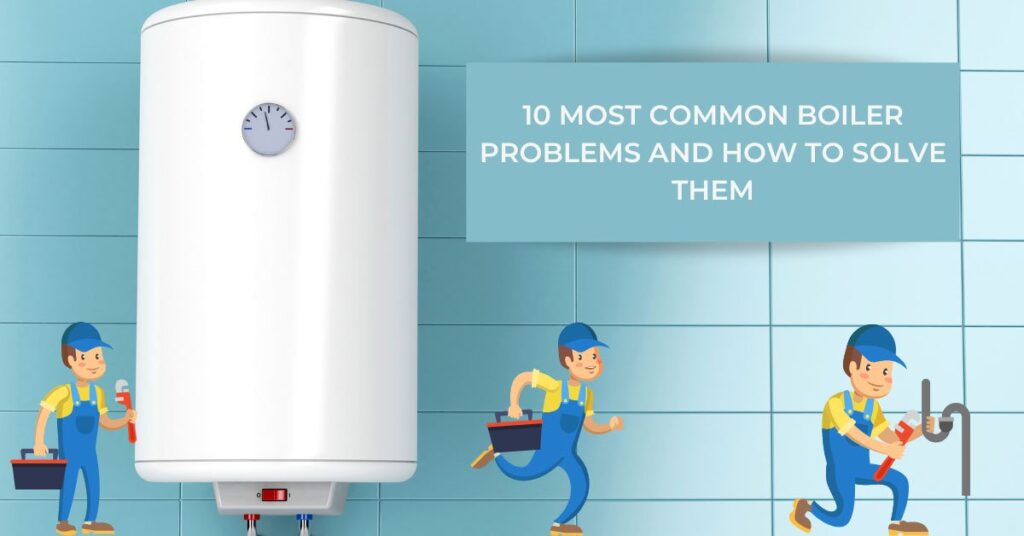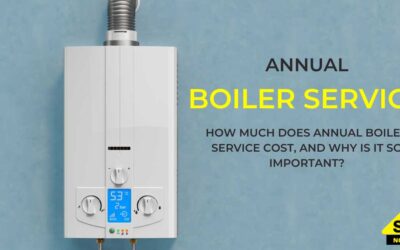Reading Time: 6 minutes

Since your boiler is a key part of your home, it’s critical to keep it running as effectively as possible.
We don’t really appreciate our boilers until something goes wrong, at which point we realise just how miserable it is to be without hot water and live in the cold.
Regardless of the type of boiler you have, regular maintenance and annual servicing can actually prevent many boiler issues. If your boiler is still covered under warranty, you can be confident that assistance will be close by.
Here are the most common 10 boiler issues, along with their likely causes and solutions.

1. No Heating or Hot Water
This issue is most often caused by a combination of factors, many of which will necessitate the replacement of a boiler component.
There is rarely a single cause of your boiler failing to provide heat or hot water; nonetheless, you should begin by ensuring that there are no problems with your boiler’s pressure or thermostat.
Solution: Check your boiler pressure gauge to see if it is below 1 to discover if this problem is caused by low pressure. If so, it may require re-pressurization. If your thermostat is the cause of the intermittent heating and hot water, check the boiler’s instructions for a possible solution.
If the pressure is normal and there is no evident cause, you should contact the manufacturer of your boiler for additional assistance.
A diverter valve, diaphragm, or other internal component problem must be checked and, if necessary, fixed by a registered Gas Safe Engineer. They will be able to assist you in repairing your boiler.
2. Low Boiler Pressure
Proper pressure is necessary for your boiler to keep the water flowing through the system. The boiler frequently locks out and displays a low-pressure error code if the pressure falls too low. Looking at the pressure gauge typically identifies low pressure.
You might have a problem if the pressure gauge on your boiler reads less than one.
Water leaks, faulty valves, or bled radiators are among the potential causes of low boiler pressure.
Solution: It’s very simple to check the boiler pressure. All you have to do is have a look at the built-in pressure gauge. If the needle is below 1, that means the boiler pressure is low. This is probably why the central heating system is not functioning properly.
Examine the boiler for any obvious leaks. If you discover any, contact a qualified engineer. If there is no leak, reset the boiler pressure. Follow the directions in your boiler’s manual.
3. Water Leakage
Depending on where the leak or drip is coming from, the causes may vary. A faulty part, such as a seal or valve, can cause a system to leak. There are occasions when the boiler leaks from the area around the tank or pipes. This may occur because of rust or poor boiler fitting.
Solution: Call a boiler engineer to get your boiler repaired. Never attempt to repair a broken boiler on your own.
4. Cold Radiators
Do you notice that your radiators aren’t as hot as they used to be?
Radiators that are cold at the bottom or have cold patches and uneven heat distribution are usually the result of too much air in the radiators or sludge build-up.
Solution: Radiators should be bled. If there is no improvement, the system may require flushing, which should be done by a qualified central heating engineer. Do not attempt to clean the sludge on your own. Contact a heating specialist. They apply chemical flushing to clean the system and eliminate sludge.
5. Frozen Condensate Pipe
Acidic waste from the boiler is transferred to the outside drains through the condensate pipe. The condensate often freezes during the colder winter months of the year, which might cause the boiler to lock out.
Solution: Put a hot water bottle, a warm towel, or a heating pack on the frozen pipe to solve the issue. You can also pour the pipe with hot water. Reset the boiler once the pipe has been fixed. This issue is easy to fix. However, if you’re not entirely confident doing it yourself, call a professional boiler engineer to thaw your condensate pipe.
6. Unusual Boiler Noise
A slight hum is a typical noise produced by the boiler. However, a buildup of sludge or scaly material is definitely impeding the water flow if your boiler sounds like a boiling kettle. This is a widespread issue in areas with hard water.
Solution: Fortunately, these problems can be addressed relatively quickly with routine boiler maintenance or as they arise.
The boiler engineer can clean your system using chemicals and high pressure during your annual service or as needed to improve water quality and add a limescale inhibitor to help prevent the buildup of mineral deposits.

7. Boiler Keeps Switching Off
Sometimes a boiler starts up properly but then trips or shuts off. This could be due to low water pressure, thermostat issues, or a lack of water flow.
Solution: Check the pressure gauge. Re-pressurize the boiler if the needle falls below 1. If the boiler pressure is appropriate, air may be trapped, which can be fixed by bleeding the radiators. Additionally, as mentioned in issue nine, check the thermostat. Call a licenced boiler professional to fix your boiler if resetting the thermostat, bleeding the radiators, and/or re-pressurizing the system fails.
8. Heating Doesn’t Work, But Hot Water Does (or the opposite)
This issue is frequently caused by older boilers. Diverter valves are the most common source of faults.
You will get warm water but no heating if there is sludge on the heater. On the other hand, you will experience heating but not warm water if the sludge is on the hot water side.
Hot water is filtered before being delivered to faucets by a diverter valve. It is also in charge of heating. The hot water is directed firstly toward the taps. It heats the house with hot water when the faucets are closed.
Sludge and debris cause the valve to become clogged over time. When this occurs, it either has an impact on the heating or the supply of hot water.
Solution: Call a heating engineer to perform a chemical flush to resolve this issue.

9. Boiler Not Responding to Thermostat
The thermostat is used to control the boiler’s heating schedule and the temperature of the central heating, so when your boiler stops responding to thermostatic control, it can cause considerable disruption.
Solution: Check the thermostat. An unintentional knock occasionally turns off or modifies the thermostat’s settings. If your thermostat settings appear to be correct, but the temperature does not, it might be time to replace your thermostat.
10. Pilot Light Issues
Because older boilers lack electronic ignition, they must be kept turned on in order to ignite the fuel within the combustion chamber. If the ignition continues to turn off, you may have a boiler problem.
This could be due to a faulty thermocouple cutting off the gas supply or a draught blowing out the flame in the boiler. Carbon deposits on the pilot light are another common problem that may need to be cleaned away.
Solution: Check that all of your other gas appliances are active. If they aren’t, contact your gas provider. If your gas supply is fine, try reigniting the pilot light by following the instructions in your boiler’s owner’s manual. If the problem with your pilot light persists, it may be worthwhile to install a new boiler.
By maintaining the boiler, its components, and the heating system, you can reduce boiler issues.
Some boiler issues, however, are unavoidable. There is no alternative but to call a heating engineer. Call the licenced heating engineer from Atapos Heating when the need arises.
We are a family-run business from Bourne End with over 19 years of experience in boiler installing, boiler repairing, and all plumbing & heating services.
If you are looking for a qualified engineer to fix your boiler problems, please do not hesitate to contact us at 07583 894 714








